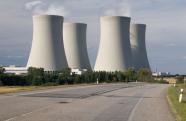Duke Energy's Focus: Nuclear and Coal Gasification

Deciding upon the future of an idle nuclear unit
in Florida, completing a $3bn-plus coal gasification
power plant in Indiana and building new natural gas
plants in North and South Carolina lead the
generation priorities for Duke Energy (NYSE: DUK)
now that it has completed its merger with Progress
Energy.
During the regular quarterly earnings call on Aug.
2, Duke said it would not comment on market rumors
that it might divest some of its Midwest unregulated
generation fleet. Duke has roughly 4,000 MW of
generation in Ohio, the company said. The company
also said it was disappointed in a recent downgrade
by Standard & Poor’s.
Duke Chairman, President and CEO Jim Rogers said the
company is open to settlement of North Carolina
Utilities Commission (NCUC) hearings regarding the
“unanticipated” CEO change following completion of
the July 2 merger.
In the much-publicized episode, the board of
directors of the combined company (dominated by the
incumbent Duke) met in closed session following the
July 2 merger and voted to effectively terminate
Progress CEO Bill Johnson as president and CEO of
the new company.
The board then asked Rogers, CEO from the incumbent
Duke who was originally supposed to act only as
chairman of the combined company, to step in as CEO
of the new Duke.
Under questioning by Wall Street analysts, Rogers
would not disclose if Duke was looking at a
financial settlement with North Carolina or a
corporate governance change.
“Now that the merger has closed, our focus is on
integrating these two great companies and continuing
to deliver on our commitments to our 7.1 million
customers,” Rogers said.
In addition to allaying shareholder and regulatory
concerns about how the merger, and the immediate
post-merger ouster of CEO Bill Johnson, Duke will
concentrate much of its attention on how to address
the Crystal River nuclear plant, which has been idle
since September 2009.
“Crystal River is a high priority for Duke,” Rogers
said.
URS Corp. was selected by Progress in May as the
preferred vendor to develop the engineering repair
plan. The final decision to repair or retire the
plant has not been made. The company is involved in
non-binding mediation with Nuclear Electric
Insurance Limited (NEIL).The mediation effort is
expected to address Progress claims for Crystal
River.
This is the largest claim that NEIL has received in
its history. The combined Duke must complete a
technical review on Crystal River. So far it appears
that repair is “technically feasible,” Rogers said.
However, the cost estimate, already pegged at
between $900m and $1.3bn in 2011, is “trending
higher,” Rogers said. While the Florida PSC wants a
decision by the end of 2012, Duke is not certain
that decision timeline can be met.
In other power generation news, the combined company
has two coal and three natural gas power units that
are in construction and expected to enter commercial
operation by the end of 2013.
Among them: The 618-MW Edwardsport integrated
gasification combined-cycle (IGCC) facility.
Commissioning of the $3.27bn project has been
delayed from September 2012 until early 2013. Rogers
noted the new plant will be able to use either
gasified coal or pipeline natural gas. The project
is 99% complete.
And, the 825-MW Cliffside advanced coal plant in
North Carolina is 98% complete. Commercial operation
of the $2.15bn project should start in the third
quarter.
As for Progress Energy, its bottom line financial
numbers for both the second quarter and the first
six months of 2012 were both below the figure
recorded for the same periods a year ago, according
to figures issued Aug. 2 by the new Duke.
By contrast, Duke’s stand-alone numbers were up
somewhat. Second quarter 2012 adjusted diluted
earnings per share (EPS) were $1.02, compared to 99
cents for the second quarter 2011.
Progress experienced second-quarter GAAP earnings of
$0.21 per share, compared to $0.60 per share for the
same period last year, primarily due to higher O&M
expense resulting from an additional extended
nuclear refueling outage in the Carolinas and higher
depreciation and amortization expense.
Progress also reported GAAP earnings for the first
six months of 2012 of $0.72 per share, compared to
$1.22 per share for the same period last year. The
financial numbers, combined with concerns about the
Progress nuclear fleet – especially the idle Crystal
River unit in Florida – were dollars and cents
issues that influenced the Duke board’s decision not
to retain Johnson, Rogers has told the NCUC.
During the Aug. 2 earnings call, Rogers again
pointed to the disappointing nuclear performance
during the past 18 months. Duke, however, is
determined to return the Progress nuclear fleet to
“excellence,” Rogers said.
In July testimony before the North Carolina panel,
Rogers said that Johnson’s leadership style, called
“autocratic” by some Duke board members, was also an
issue.
Copyright © 1996-2012 by CyberTech, Inc. All rights reserved.
To subscribe or visit go to: http://www.energycentral.com
To subscribe or visit go to: http://www.energybiz.com